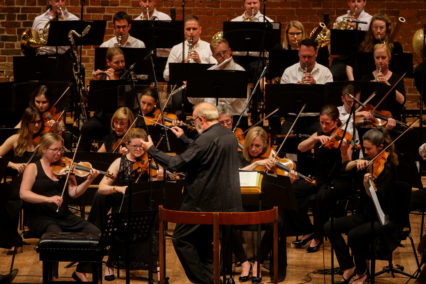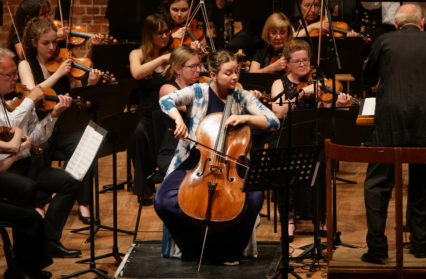David Truslove explores Britten Pears’ Aldeburgh Festival by taking two performances from BBC National Orchestra of Wales at the historic Snape Maltings.
Two consecutive evenings with the BBC National Orchestra of Wales might be considered something of a luxury particularly when it’s in the very special surroundings of the Snape Maltings. As part of this year’s Aldeburgh Festival, Martyn Brabbins guided the orchestra through both programmes (relayed lived on BBC Radio 3), of which the first featured music conceived in the 1950s, while the second gave pride of place to the premiere of a new cantata based on the ancient Welsh legend of the Lady of the Lake.
Proceedings on Thursday began with Elizabeth Maconchy’s Proud Thames, a work written in response to a London County Council competition (which she won) for a Coronation Overture. Brabbins steered the orchestra through a vividly scored work evoking the spirit of the Thames from its source to the City. From its germinal trumpet figure and wriggling woodwind through to its majestic close, this six-minute tribute is rich in detail and accumulating orchestral sonority. While somewhat limited in melodic inspiration the BBC NOW made a good case for this curtain-raiser.
Following an appreciation of Sir Humphrey Burton’s contribution to music broadcasting in the UK and his presentation with honorary membership of the Royal Philharmonic Society, there followed a performance of Walton’s Cello Concerto. This was originally conceived for the Ukrainian-born cellist Mr Gregor Piatigorsky. Here the soloist was Laura van der Heijden who had won the BBC Young Musician of the Year Competition in 2012 with this very concerto. I’ve heard the opening ‘Moderato’ taken a little faster than this performance, but its relaxed tempo did at least allow for orchestral colouring to register fully within its soulful rumination. Despite van de Heijden’s technically secure and poised address, and sensitive collaboration from the players, the movement felt earthbound.
Walton’s characteristic bite was much in evidence in the scherzo, its nervous energy and scintillation fully realised, even if the soloist’s dynamic range seemed somewhat restricted. This performance really took wing in the finale: van de Heijden beguiling in the opening ‘Lento’ section where elegance of line and musical intelligence combined for a wonderful intimacy. As if ignited by the third variation’s muscular rhythms, the orchestra shone and played with unrestrained zeal in the tuttis. The closing paragraphs seemed to reach into eternity, Brabbins making a stretch limo of the phrases, but all the better for capturing Walton’s tenderness. Little wonder Humphrey Burton commented in his earlier speech that the concerto was really a love letter to the composer’s wife Susana.
There followed a blistering account of Shostakovich’s 10th Symphony – a work I heard this orchestra play in a memorable performance under Thomas Søndergård at the 2017 Proms. Its first movement is an emotional roller-coaster which can flag; here Brabbins shaped its arch-like design with flawless control, its momentum perfectly judged. String playing was of the highest calibre, so too woodwind cameos, while the perilously exposed piccolo rounded off the movement to bring an icy calm. The mechanistic fervour of the ‘Allegro’ unlocked the orchestra’s full power, generating swagger and venom. Trumpets scorched the air, the whole producing enough energy to power Snape for a month. A more personal quality inhabits the ‘Allegretto’ with personal references to both the composer and Elmira Nazirova (his muse and confidante) whose melodic shapes are poignantly entwined in its closing bars. Solo horn and assorted woodwind contributions (especially bassoon) brought this movement to life with spine-chilling effects also from tam-tam, strings and cor anglais. The troublesome finale, with its abrupt emotional gear change, brought fresh vigour from the players who seemingly evoked tortured souls and gyrating extroverts. Whatever your feel about this movement’s volte-face, its triumphant end was delivered with undeniable jubilation; the BBC NOW playing as if their lives depended on it.

Friday’s concert brought the eagerly anticipated premiere of Gavin Higgins’s The Faerie Bride with a libretto by Horrid Henry author Francesca Simon. Higgins is currently the composer-in-association with the BBC National Orchestra of Wales and has already won acclaim for his debut opera The Monstrous Child at the Royal Opera House. Called by the composer a cantata, The Faerie Bride is a Britten Pears Arts commission for the 73rd Aldeburgh Festival and is written for two soloists and medium sized orchestra. Cultural difference and tolerance is at the centre of a story about a human who falls in love with a fairy encountered on Carmarthenshire’s Llyn y Fan Fach. She will be the farmer’s bride on condition he agrees not to strike her three heart blows. But a suspicious, unwelcoming community and misunderstandings of her clairvoyance conspire to ruin the marriage and the fairy returns with her children to the lake. Musical characterisation is deftly woven into the score, allowing gentle, keening lines for Roderick Williams’ warm baritone, while more angular contours bring sharp differentiation for Marta Fontanals-Simmons’ cooler mezzo. Only when singing in Welsh did Higgins provide a flowing lyricism rooted in Welsh folk song, culminating in a beautifully expressive version of ‘Suo Gân’. There was plenty to enjoy in the musical imagery of a dark lake, love’s ripening, a rustic wedding and a procession of farm animals to the marital home. Over the work’s forty minutes, the BBC NOW played with its customary polish and sensitivity, beginning and ending with ominous timbres to evoke the depths of the lake.
A sense of salt spray was vividly captured at the start of the evening with a breezy account of Grace Williams’ Sea Sketches, a five-movement work for string orchestra directly inspired by the Glamorganshire coastline near her parent’s home at Barry. Written in her London flat in 1944, its craftsmanship is readily apparent and demonstrates a violinist’s understanding of string textures, something recognised by Oxford University Press when they published the work six years later. The work variously evokes blustering winds, small boats rocking in tranquil waters, fogbound craft, invigorating ‘Breakers’ and finally a languorous movement of vessels under a starlit sky. It was given an affectionate performance, the BBCNOW exhibiting fabulously silky string playing.
Equally polished was the orchestra’s reading of Britten’s rarely performed Suite of English Folk Tunes, subtitled ‘A Time There Was’. A late work from 1974, it’s a show piece in many ways for the orchestra, where every instrument has its moment in the sun. Menacing drums and brass chorales coloured ‘Cakes and Ale’, harp and strings caught the ear in ‘The Bitter Withy’, while zesty woodwinds and muted trumpets brought pageantry to ‘Hankin Booby’. Violins alone glittered in the jig that is ‘Hunt the Squirrel’ and a plaintive cor anglais roamed the elegiac ‘Lord Melbourne’ – the only folk melody Britten sets in its entirety. Brabbins and the BBCNOW were peerless advocates for a work that surely deserves to be better known.
Aldeburgh Festival: BBC National Orchestra of Wales – Martyn Brabbins (conductor), Laura van der Heijden (cello), Roderick Williams’s (baritone), Marta Fontanals-Simmons (mezzo-soprano)
The Aldeburgh Festival continues until 26 June.
All photographs courtesy of Britten Pears Arts.











